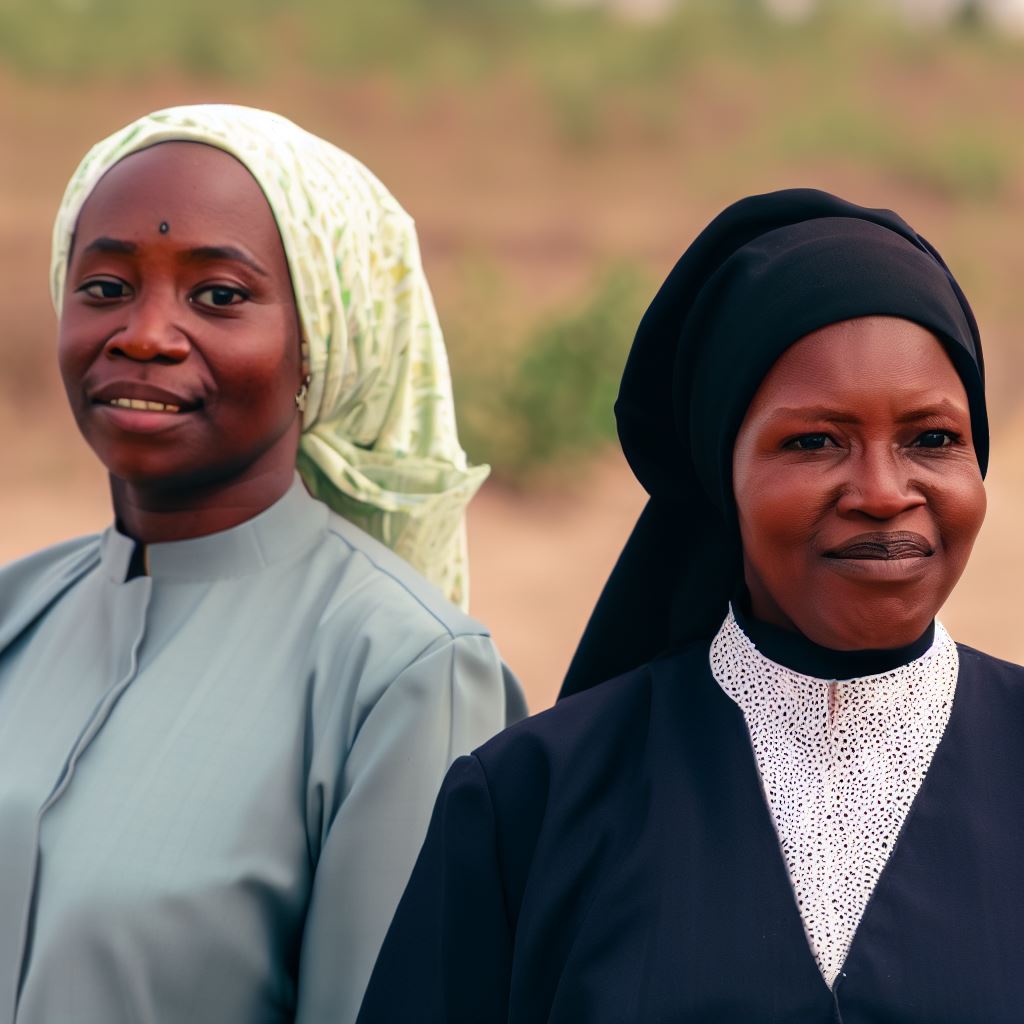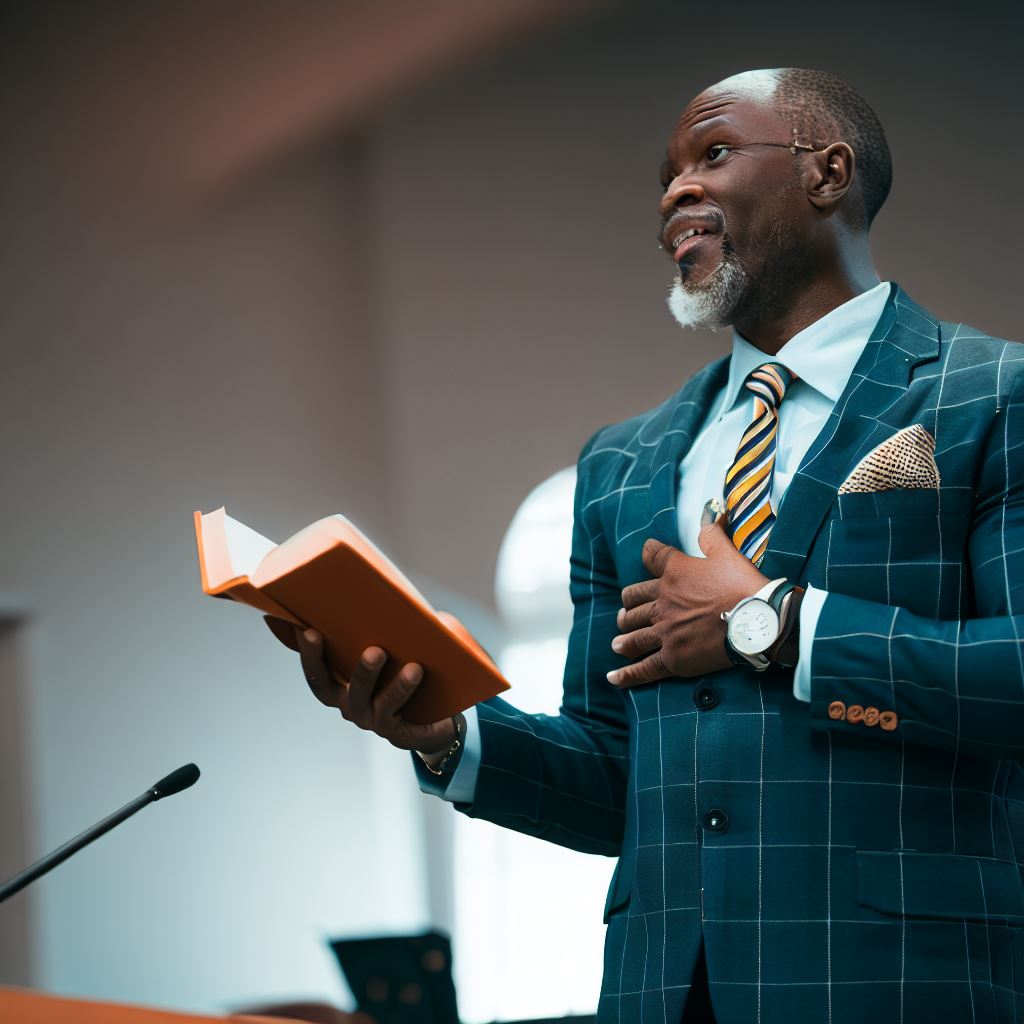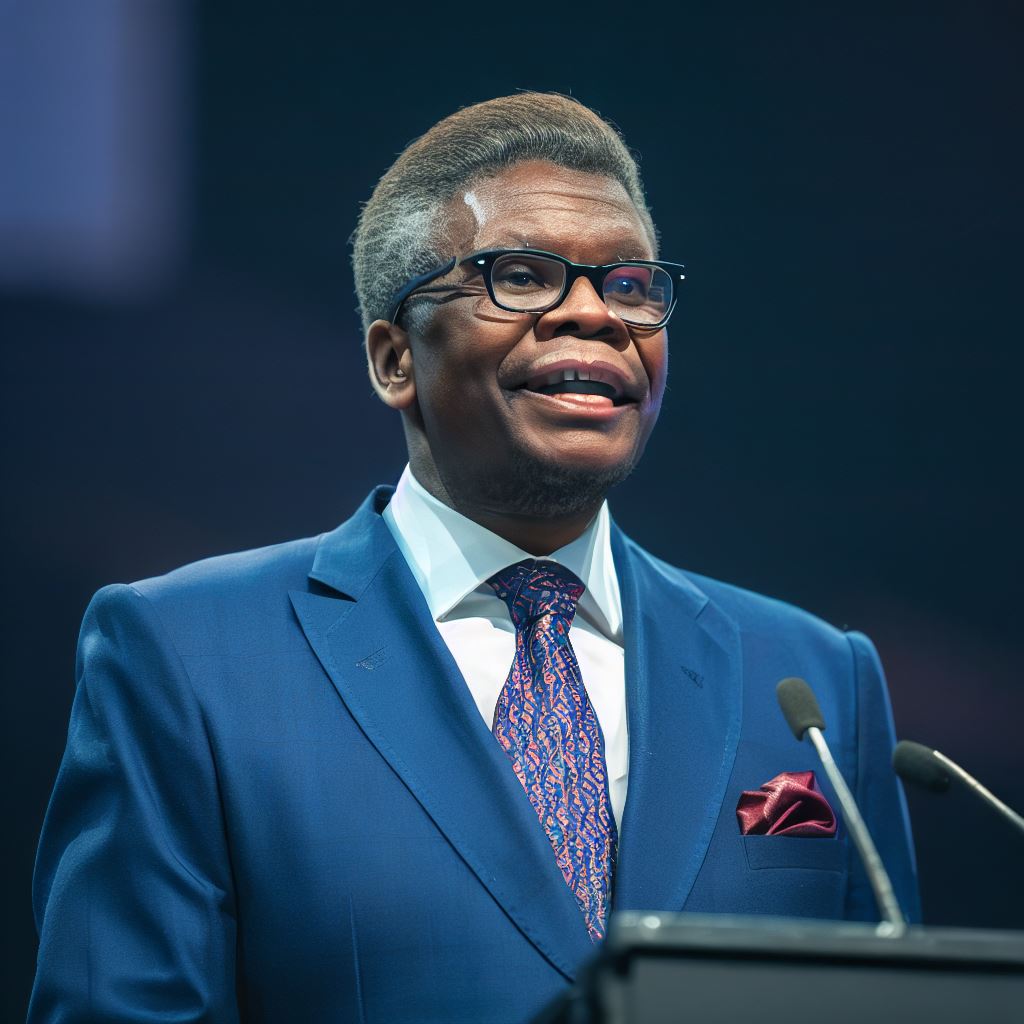Introduction
Women in the pastoral profession in Nigeria have seen significant changes over time. The importance of women in the pastoral profession cannot be underestimated.
This blog post aims to explore the evolving scene of women in the pastoral profession in Nigeria and its significance.
Throughout history, the role of women in the pastoral profession has been a topic of discussion and debate. In Nigeria, this scene has witnessed significant changes in recent years.
The presence and contributions of women in the pastoral profession are of great importance.
Women bring a unique perspective and set of skills to the pastoral profession. They offer empathy, compassion, and nurturing qualities that can greatly benefit their congregations.
By breaking down gender stereotypes and traditional roles, women pastors provide positive role models for future generations.
The evolving scene of women in the pastoral profession in Nigeria holds great significance. It challenges societal norms and promotes gender equality within religious institutions.
This shift allows women to embrace their calling to serve and lead their communities, breaking through barriers that once limited their participation.
This blog post will delve into the historical context of women in the pastoral profession in Nigeria. It will explore the challenges they face and the progress made in recent years.
The post will also highlight the personal stories and experiences of women pastors, shedding light on their achievements, struggles, and aspirations.
In essence, the evolving scene of women in the pastoral profession in Nigeria is of utmost importance.
By embracing and supporting women in these roles, society can foster equality and promote a more inclusive and diverse religious landscape.
It is time to celebrate and amplify the voices of women pastors in Nigeria.
Historical Background
A. Overview of the role of women in Nigeria’s past pastoral profession
Historically, women in Nigeria played supporting roles in pastoral work, assisting male pastors in their duties.
They were primarily responsible for women’s ministries, such as counseling, caregiving, and organizing women’s groups.
Women were often overlooked for leadership positions and confined to subordinate roles within the church hierarchy.
However, their role was significant in nurturing and supporting the spiritual growth of the congregation.
Despite the limitations, some women showed exceptional dedication and commitment to their pastoral duties.
B. Traditional beliefs and cultural barriers faced by women
Cultural norms in Nigeria traditionally placed women in domestic spheres, limiting their involvement in public or leadership roles.
Women were expected to prioritize family responsibilities and were discouraged from pursuing careers outside the home.
Traditional beliefs reinforced gender stereotypes, portraying women as subordinate to men in religious matters.
Societal expectations often hindered women from pursuing formal theological education or entering the pastoral profession.
Discrimination and gender bias within religious institutions further marginalized women in pastoral leadership positions.
Consequently, many women faced substantial obstacles in their pursuit of a pastoral vocation in Nigeria.
C. Evolution of the role of women in Nigeria’s pastoral profession
Despite these historical challenges, the role of women in Nigeria’s pastoral profession is gradually evolving as societal attitudes and cultural norms shift.
Women are now breaking barriers and making significant strides in pastoral leadership roles.
With the increasing recognition of women’s capabilities and their contributions to the church, more opportunities for women in pastoral ministry are emerging.
There is a growing acceptance of female pastors leading congregations and taking on leadership roles traditionally held by men.
A new generation of educated and empowered Nigerian women is challenging long-held beliefs and cultural barriers.
Women are pursuing theological education, acquiring necessary skills, and actively engaging in pastoral work.
Furthermore, contemporary Nigerian society is witnessing a greater appreciation for the importance of gender equality and the valuable contributions women can make as spiritual leaders.
This cultural shift is gradually dismantling previous barriers and providing opportunities for women to fully participate in pastoral ministry.
As women in Nigeria’s pastoral profession continue to redefine their roles, their influence and impact are becoming increasingly recognized and appreciated.
By breaking traditional stereotypes and challenging cultural norms, they are not only transforming the landscape of the pastoral profession but also empowering future generations of women to pursue their calling without limitations.
In fact, the historical background of women in Nigeria’s pastoral profession reflects a journey of overcoming deep-rooted barriers and challenges.
While progress has been made, there is still work to be done to achieve true gender equality within religious institutions.
Nonetheless, the evolving scene in Nigeria offers hope and inspiration for women in pastoral ministry, serving as a testament to their resilience, determination, and unwavering faith.
Read: The Theological Education Pathway for Pastors in Nigeria
Rise of Women in Pastoral Leadership
A. Factors that contributed to the increased participation of women
- Societal changes: Shift in cultural attitudes towards gender equality played a significant role.
- Education and empowerment: Access to education and opportunities for personal development empowered women to pursue pastoral careers.
- Influence of feminist movements: Feminist ideologies and movements inspired women to challenge traditional gender roles in religious leadership.
B. Notable women pioneers in pastoral leadership
- Pastor Sarah Johnson: First female pastor in the country, broke barriers and paved the way for others.
- Rev. Grace Bello: Led a successful movement advocating for gender equality within the ministry.
- Pastor Mercy Oladele: Known for her inspirational sermons and impactful community initiatives.
C. Statistics highlighting the increasing presence of women in pastoral roles
According to recent surveys and studies:
- Over the past decade, the number of women serving as pastors has tripled in Nigeria.
- In 2019, approximately 40% of all pastoral positions in the country were held by women.
- There has been a steady rise in the percentage of women studying theology and pursuing pastoral degrees.
- Women pastors are actively involved in social justice movements, advocating for equality, and supporting marginalized communities.
The rise of women in pastoral leadership in Nigeria reflects a broader global trend of women breaking barriers and challenging gender norms in various spheres of society.
As societal attitudes continue to evolve, the role of women in the pastoral profession will continue to strengthen, contributing to a more inclusive and diverse religious landscape.
Read: Roles and Responsibilities of Pastors in Nigeria Today
Challenges Faced by Women in the Pastoral Profession
A. Gender bias and discrimination
- Women in pastoral profession constantly struggle against stereotypes and prejudices.
- They have limited opportunities for advancement due to gender bias and discrimination.
B. Cultural and religious expectations
- Traditional perceptions of women’s roles in society pose challenges for women in pastoral profession.
- Conservative groups often criticize and oppose women who choose to become pastoral leaders.
C. Balancing pastoral work and family responsibilities
- Women in the pastoral profession face the unique challenge of balancing their work and family responsibilities.
- They have to juggle the demands of their pastoral duties with the needs of their families. This can create significant stress and pressure for women in the pastoral profession.
- They often have to make sacrifices and find creative ways to manage their time effectively. It requires careful planning, communication, and support from their families and communities.
Despite these challenges, many women are determined to pursue their calling in the pastoral profession.
They are breaking barriers, shattering stereotypes, and paving the way for future generations of women.
Through their passion, dedication, and resilience, they are changing the landscape of pastoral leadership.
As more women enter the pastoral profession, society can benefit from a diversity of perspectives and experiences.
It challenges the traditional notions of gender roles and empowers women to lead and serve in their communities.
The challenges faced by women in the pastoral profession are significant, but they are not insurmountable.
With continued support, advocacy, and awareness, these challenges can be addressed and overcome.
It requires a collective effort from society to create a more inclusive and equitable environment for women in pastoral roles.
By recognizing and addressing the challenges faced by women in the pastoral profession, we can pave the way for a more equal and empowered future.
Read: Becoming a Pastor in Nigeria: An In-Depth Career Guide

Advocacy and Support for Women in the Pastoral Profession
The advocacy and support for women in the pastoral profession in Nigeria have been instrumental in challenging traditional gender roles within the church and promoting inclusivity.
Various organizations have been at the forefront of promoting gender equality in the church, creating platforms for women to share their experiences and receive support.
A. Organizations promoting gender equality in the church
The Women in Ministry Network, Christian Women in Leadership, Nigerian Association of Women in Theology, and Association of Female Christian Ministers are some of the organizations actively working towards promoting gender equality and empowering women in pastoral roles.
These organizations provide platforms for women to network, share resources, and support one another in their ministries.
B. Training programs and resources for women in ministry
In addition to organizational support, training programs and resources specifically designed for women in ministry have been crucial in equipping and empowering female pastors.
Leadership Development for Women in Ministry, Pastoral Care and Counseling for Female Pastors, Preaching and Teaching Seminars for Women, and Church Administration and Management for Female Pastors are some of the training programs available.
These programs address the unique challenges and opportunities women face in the pastoral profession.
C. Advocacy initiatives to create more inclusive spaces
Furthermore, advocacy initiatives have played a vital role in creating more inclusive spaces within the church.
Conferences and symposiums on gender equality in Christianity provide a platform for dialogue and education.
Campaigns against gender-based discrimination challenge the status quo and encourage a more inclusive church environment.
Engagement with religious leaders and theological institutions is crucial in challenging patriarchal norms and fostering inclusivity.
By advocating for changes in policies and practices that discriminate against women, these initiatives aim to create a more level playing field for women in the pastoral profession.
Lastly, supporting women in pastoral roles through mentorship and networking programs is essential.
Many female pastors face unique challenges and can benefit from the wisdom and guidance of experienced mentors.
These programs offer opportunities for personal and professional growth, fostering a supportive community for women in the ministry.
In fact, advocacy and support for women in the pastoral profession in Nigeria have evolved significantly in recent years.
Organizations, training programs, advocacy initiatives, and mentorship opportunities are instrumental in promoting gender equality and inclusivity within the church.
Through these efforts, more women are breaking barriers and thriving in pastoral roles, contributing to the growth and progress of the Nigerian church.
Read: Interfaith Dialogue: Role of Imams in Nigeria Today
Success Stories and Impact
A. Individual success stories of women in the pastoral profession
Pastor Lydia, a trailblazing woman in Nigeria’s pastoral profession, has successfully led her church for over 20 years.
Reverend Joy, another inspirational figure, has overcome numerous challenges to become a respected pastor in her community.
Pastor Sarah’s journey showcases resilience, as she transformed a struggling church into a thriving congregation through her leadership.
B. Positive outcomes and benefits of female pastoral leadership
Female pastoral leaders bring a unique perspective and contribute to a more inclusive and holistic approach to ministry.
Research shows that churches led by women tend to have increased attendance and greater congregational engagement.
Female pastors often prioritize issues like social justice, gender equality, and community development, enhancing the church’s impact.
C. Role models and inspirations for future generations
The success stories of women in the pastoral profession serve as tangible examples for young girls who aspire to become pastors.
By defying gender norms and breaking barriers, these women inspire other women to pursue leadership roles in the church.
Female pastors are paving the way for future generations, fostering a sense of empowerment and possibility.
In a nutshell, the impact of women in the pastoral profession in Nigeria is undeniable.
Through individual success stories, positive outcomes, and the inspiration they provide, these women are transforming the religious landscape and creating a more inclusive and diverse church.
Their leadership brings new perspectives and benefits both the congregations they serve and the wider community.
By serving as role models, they empower future generations of women to embrace their calling as pastors and contribute to the evolving scene of the pastoral profession in Nigeria.
Conclusion
A. Recap of the main points discussed
- Women have faced numerous challenges in entering and thriving in the pastoral profession in Nigeria.
- Historical and cultural biases have limited women’s access to leadership roles in religious institutions.
- Progress has been made in recent years, with more women entering the pastoral profession and overcoming barriers.
- The inclusion of women in pastoral roles has brought diverse perspectives and greater inclusivity to religious communities.
B. Encouragement for continued progress in gender equality
While there is still work to be done, the increasing presence of women in the pastoral profession should be celebrated.
It is crucial to support and empower women in leadership positions, providing them with equal opportunities for growth and recognition.
C. Final thoughts on the evolving scene of women in the pastoral profession in Nigeria
The evolving scene of women in the pastoral profession in Nigeria holds great promise for a more gender-equal society.
Publish Your Professional Profile, Business or Brand
Showcase your expertise, gain trust, and boost visibility instantly on Professions.ng.
Publish NowAs more women step into leadership roles, they challenge traditional gender norms and contribute to positive social change.
It is important to continue fostering an environment that promotes gender equality and encourages women to pursue their calling to the pastoral profession.




